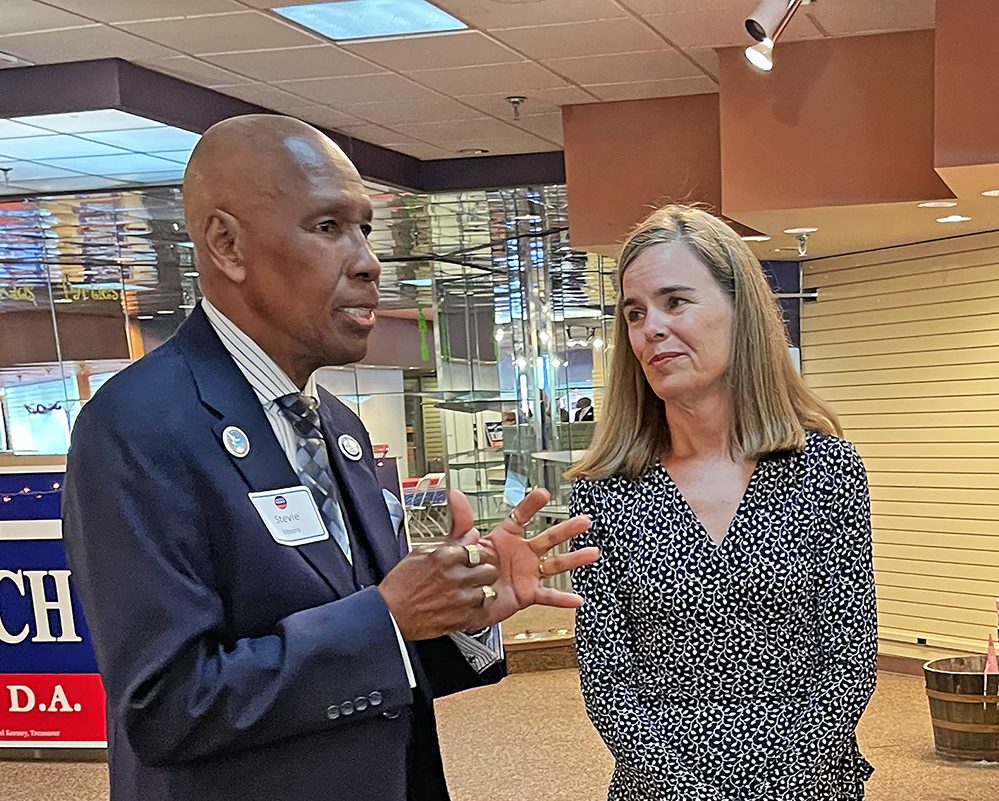The two candidates for Shelby County District Attorney General held near-simultaneous events on Monday, at sites roughly 20 miles apart.
Incumbent Republican D.A. Amy Weirich opened up her campaign headquarters at 6645 Poplar in the CarreFour shopping center and addressed a group of supporters and other attendees there. Democratic challenger Steve Mulroy, meanwhile, was conducting a press conference Downtown outside the Shelby County Justice Center at 201 Poplar.
The location of Weirich’s event was essentially the subject matter of Mulroy’s.
The incumbent D.A. had sent out an announcement of her HQ “grand opening” Monday morning via an email, the subject line of which was “Don’t forget to stop by on your way home.”
That prompted Mulroy to call his press conference, where he noted the location of the venue, just inside the Germantown city line. In a press release that paralleled his press conference statements, Mulroy said, “The Weirich HQ opens in one of the wealthiest, least crime-ridden ZIP codes in the county. This is not only tone-deaf, it’s emblematic of what’s wrong with that office, where 90 percent of the attorneys and supervisors are white, in a 55 percent Black county where criminal defendants are almost 90 percent Black.”
Those numbers are basically the same ones he put forth in another press conference in early April, at which he charged that the lack of racial diversity was a problem with the Weirich-run D.A.’s office. And he offered some new “background stats” to buttress his remarks on Monday. “The Germantown ZIP code is the third-wealthiest ZIP code in Shelby County, with a median income of $101,000. The U.S. Census says it’s about 5 percent Black. The website crimegrade.org gives it an A+, the lowest-crime category.”
In other words, Mulroy seemed to be saying, Weirich’s injunction to “stop by on your way home” implied that her political constituency, in East Memphis and outward into the elite suburbs, was far removed from the actual urban landscapes where most crime occurred, with the further implication that Weirich’s concerns would be otherwise than focused on crime in the inner city. Other speakers at the Mulroy press conference conveyed similar messages.
While there was certainly a fair assemblage of suburbanites at Weirich’s headquarters event, her crowd was somewhat more varied than that, including such pillars of the law enforcement community as Juvenile Court Judge Dan Michael, Bill Gibbons of the Memphis-Shelby Crime Commission, and Buddy Chapman of CrimeStoppers.
And she was introduced to the crowd by Stevie Moore, an African American whose son was murdered 19 years ago and who subsequently founded the justly celebrated F.F.U.N. (Freedom from Unnecessary Negatives), an organization whose stated mission is “to provide the at-risk community holistic alternative solutions regarding their social issues (i.e., drugs, alcohol, low self-esteem, crime, gangs, lack of educational and basic daily survival needs).”
Moore vouched for Weirich as “a person who’s in our communities, and I can call her any time. The problem I had with most of our political leaders, they don’t come out to our communities. But she’s in the community, and that’s why I’m here for her today.”
In her own remarks, Weirich defended her efforts to control and punish crime and lauded such developments as the Tennessee legislature’s passage of “truth-in-sentencing” legislation. She said she intended “to focus our energies and our work and our mission, on protecting the victims in this community, on protecting the families in this community whose lives have been forever destroyed by the violence. So don’t fuss at me about being too tough on crime.”
